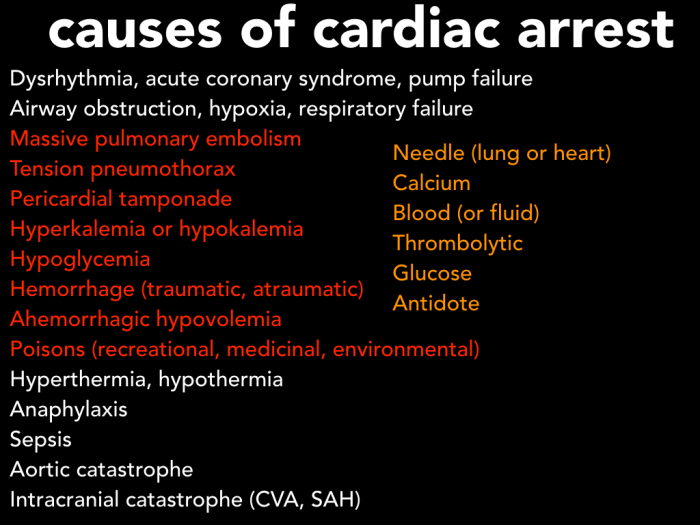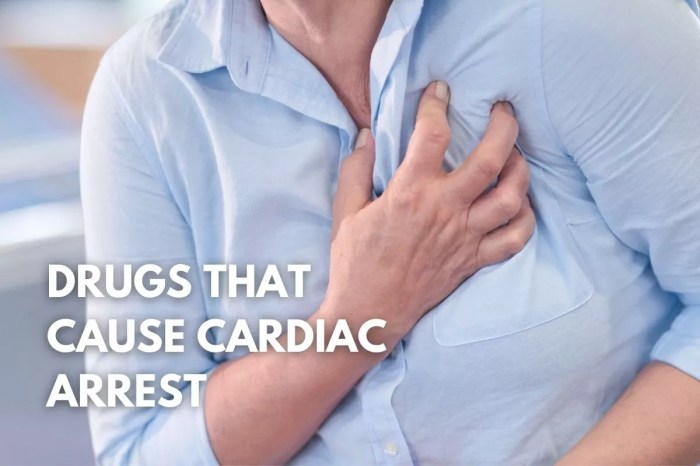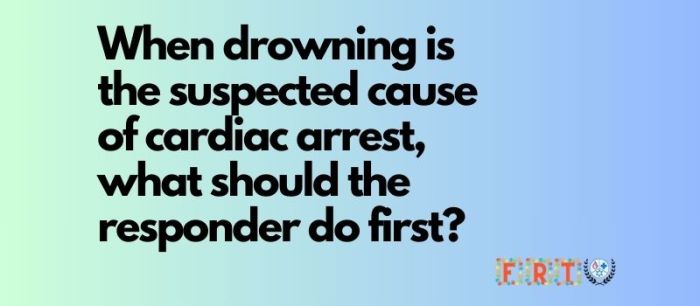When drowning is suspected cause of cardiac arrest – When drowning is suspected as the cause of cardiac arrest, immediate and appropriate medical intervention is crucial. This article delves into the mechanisms of drowning-induced cardiac arrest, explores treatment and management strategies, and highlights preventive measures to minimize the risk of such events.
Understanding the pathophysiology and clinical presentation of drowning-related cardiac arrest is essential for healthcare professionals to provide optimal care and improve patient outcomes.
Signs and Symptoms of Drowning-Related Cardiac Arrest

Drowning-related cardiac arrest occurs when the heart stops beating due to submersion in water. The signs and symptoms of drowning-related cardiac arrest are similar to those of other types of cardiac arrest, but there are some key differences.
The most common signs and symptoms of drowning-related cardiac arrest include:
- Loss of consciousness
- Absence of breathing
- No pulse
- Bluish or pale skin
- Dilated pupils
- Watery discharge from the mouth or nose
- Coughing or vomiting water
The differential diagnosis for drowning-related cardiac arrest includes other causes of cardiac arrest, such as:
- Myocardial infarction
- Pulmonary embolism
- Arrhythmia
- Drug overdose
Mechanisms of Drowning-Induced Cardiac Arrest

Drowning-induced cardiac arrest is caused by a combination of factors, including hypoxemia, acidosis, and electrolyte imbalances.
When a person is submerged in water, they are unable to breathe. This leads to a decrease in oxygen levels in the blood, which can cause hypoxemia. Hypoxemia can damage the heart muscle and lead to cardiac arrest.
In addition to hypoxemia, drowning can also cause acidosis. Acidosis occurs when the blood becomes too acidic. This can also damage the heart muscle and lead to cardiac arrest.
Finally, drowning can also cause electrolyte imbalances. Electrolyte imbalances can disrupt the electrical activity of the heart, which can lead to cardiac arrest.
The sequence of events leading from drowning to cardiac arrest is as follows:
- Submersion in water
- Hypoxia
- Acidosis
- Electrolyte imbalances
- Cardiac arrest
Treatment and Management of Drowning-Related Cardiac Arrest
The immediate treatment for drowning-related cardiac arrest is CPR. CPR should be started immediately and continued until emergency medical services arrive.
Once emergency medical services arrive, they will provide advanced life support, including defibrillation and hypothermia management.
Defibrillation is a procedure that uses an electrical shock to restart the heart. Hypothermia management is a procedure that uses cold water to lower the body temperature. This can help to improve the chances of survival.
The long-term treatment for drowning-related cardiac arrest depends on the severity of the injury. Some patients may require ongoing medical care, such as rehabilitation or medication.
Prevention of Drowning-Related Cardiac Arrest

The best way to prevent drowning-related cardiac arrest is to prevent drowning. There are a number of things that can be done to prevent drowning, including:
- Learning to swim
- Wearing a life jacket when boating or swimming in open water
- Supervising children when they are swimming
- Avoiding alcohol and drugs when swimming
In addition to these measures, it is also important to be aware of the risks of drowning and to take steps to avoid them.
Frequently Asked Questions: When Drowning Is Suspected Cause Of Cardiac Arrest
What are the common signs and symptoms of drowning-related cardiac arrest?
Signs and symptoms may include unconsciousness, lack of breathing, pale or bluish skin, dilated pupils, and cold and clammy skin.
How is drowning-related cardiac arrest treated?
Treatment involves immediate CPR, defibrillation if indicated, and hypothermia management to improve neurological outcomes.
What are the risk factors for drowning-related cardiac arrest?
Risk factors include lack of swimming ability, alcohol consumption, cold water temperatures, and underlying medical conditions that affect cardiac function.